Bird’s Eye
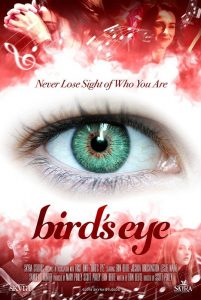 One of the short films being screened this year by the Fort Myers Film Festival is Bird’s Eye. A spellbinding 13-minute drama, Bird’s Eye tells the story of a rigid music professor who loses her sight only to find perfect clarity in an unexpected place – within the walls of an at-risk urban high school. Scott Poiley directs. The film was written and produced by Erin Beute, who stars in the film as music instructor/composer Dr. McAllister as well.
One of the short films being screened this year by the Fort Myers Film Festival is Bird’s Eye. A spellbinding 13-minute drama, Bird’s Eye tells the story of a rigid music professor who loses her sight only to find perfect clarity in an unexpected place – within the walls of an at-risk urban high school. Scott Poiley directs. The film was written and produced by Erin Beute, who stars in the film as music instructor/composer Dr. McAllister as well.
We meet Dr. McAllister as she labors at the piano, fitfully trying to piece together fragmented notes and bars into a magnum opus. Try as she might, the work remains out of reach/ The harder she pushes, the more it evades her.
McAllister 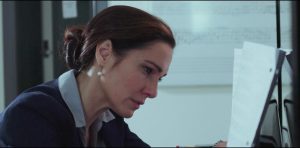 is angry, bitter and surly … as one of her hapless students discovers to her chagrin when she interrupts McAllister to ask why the good doctor gave her a failing grade on a recent assignment. The poor girl’s timing couldn’t be worse. She becomes the object of McAllisters pent-up frustration at her own
is angry, bitter and surly … as one of her hapless students discovers to her chagrin when she interrupts McAllister to ask why the good doctor gave her a failing grade on a recent assignment. The poor girl’s timing couldn’t be worse. She becomes the object of McAllisters pent-up frustration at her own 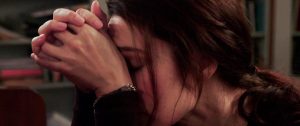 inability to achieve the perfection she demands of herself. As the student watches with growing despair, McAllister literally tears her student’s composition to pieces, eviscerating the poor girl one painful stanza at a time.
inability to achieve the perfection she demands of herself. As the student watches with growing despair, McAllister literally tears her student’s composition to pieces, eviscerating the poor girl one painful stanza at a time.
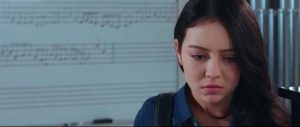 “I love this moment!” effuses Director Scott Poiley. “Most would view McAllister’s aggressively harsh evaluation of the student’s work as mean. I don’t. McAllister is simply projecting her own personal demands of excellence onto her student.”
“I love this moment!” effuses Director Scott Poiley. “Most would view McAllister’s aggressively harsh evaluation of the student’s work as mean. I don’t. McAllister is simply projecting her own personal demands of excellence onto her student.”
In 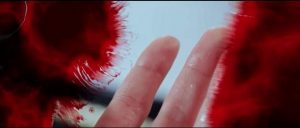 the middle of the tirade, a droplet of blood cascades onto the redletter failing grade on the sheet music in McAllister’s hand. In the next instant, McAllister suffers a massive diabetic retinal hemorrhage that robs her of nearly all her sight, sweeping away
the middle of the tirade, a droplet of blood cascades onto the redletter failing grade on the sheet music in McAllister’s hand. In the next instant, McAllister suffers a massive diabetic retinal hemorrhage that robs her of nearly all her sight, sweeping away 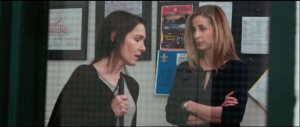 with it McAllister’s identity—her place in the world disappearing as quickly as her eyesight.
with it McAllister’s identity—her place in the world disappearing as quickly as her eyesight.
Dr. McAllister’s grief and isolation render her even more emotionally impenetrable than before until one afternoon, a year later, 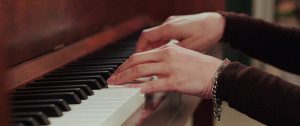 she’s thrust against her will into a classroom at St. Matthew’s Academy with a group of at-risk students she does not want to teach. As she virtually hides behind the piano that sits in front of the room, one of the students steps forward to share a rap song
she’s thrust against her will into a classroom at St. Matthew’s Academy with a group of at-risk students she does not want to teach. As she virtually hides behind the piano that sits in front of the room, one of the students steps forward to share a rap song  he’s recently written. Involuntarily, McAllister’s fingers glide across the keys, echoing, then amplifying his notes and refrains. As the rapper and the other students look on in amazement, a torrent of musical creativity comes pouring out.
he’s recently written. Involuntarily, McAllister’s fingers glide across the keys, echoing, then amplifying his notes and refrains. As the rapper and the other students look on in amazement, a torrent of musical creativity comes pouring out. 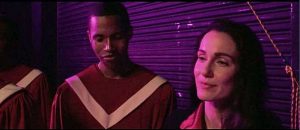 Unblocked at last, McAllister begins creating music like she never has before.
Unblocked at last, McAllister begins creating music like she never has before.
Together, McAllister and her new students step falteringly into new possibility and purpose – beyond boundary and 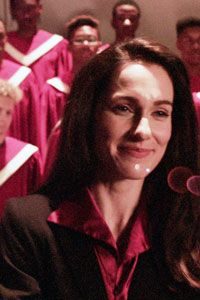 circumstance – no matter the consequences – winding up at a singing competition where they nervously wait in the wings as the group on stage brings down the house with incredible harmony, intonation and tonality.
circumstance – no matter the consequences – winding up at a singing competition where they nervously wait in the wings as the group on stage brings down the house with incredible harmony, intonation and tonality.
“It’s going to be fine,” McAllister reassures her students. “Just sing for them the way you’ve sung it for me, that’s all I can ask,” she adds as they make their way center stage.
“In every hero’s journey, [the hero] must [ultimately] slay the dragon,” observes Poiley who, like Dr. McAllister, had to overcome severe physical challenges that threatened to derail his own creative elan.
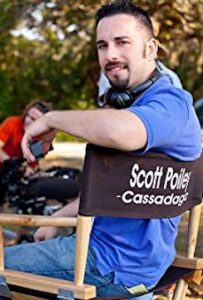 “For McAllister, the loss of her sight is, in fact, the magic talisman—assisting her on her journey to enlightenment. The Goliath which she must overcome is her own self-doubt. It is in this loss that she gains her elusive perfection.”
“For McAllister, the loss of her sight is, in fact, the magic talisman—assisting her on her journey to enlightenment. The Goliath which she must overcome is her own self-doubt. It is in this loss that she gains her elusive perfection.”
And while that’s where the short ends, it may also be the beginning of a longer and larger journey not only for Dr. McAllister and her students, but for Beute and Poiley as well. That’s because Beute and her cohorts have plans to turn the short drama into a full-length film provided they can find the funding for such an ambitious project.
There’s much in this quasi 13-minute trailer to commend it to a full-length production.
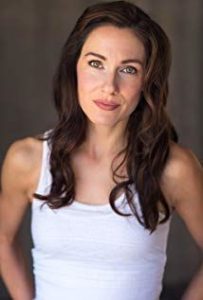 The short’s opening sequence is forceful, electrifying and gripping just like the opening four notes of Beethoven’s 5th. And just like the second greatest composer’s magnum opus, the opening of Bird’s Eye is also much more complex and multi-layered than we initially realize. It sets the stage for the staggering, tumultuous rhythms and interrelationships that follow, permeating and developing the film’s opening themes.
The short’s opening sequence is forceful, electrifying and gripping just like the opening four notes of Beethoven’s 5th. And just like the second greatest composer’s magnum opus, the opening of Bird’s Eye is also much more complex and multi-layered than we initially realize. It sets the stage for the staggering, tumultuous rhythms and interrelationships that follow, permeating and developing the film’s opening themes.
The acting is exceptional, starting with Beute, who portrays a sighted person who has traded her vision in the physical world for bird’s eye clarity in the realm of music and the complex dynamics that drive musicians from classical to pop, hip hop and rap. (It’s intriguing that in 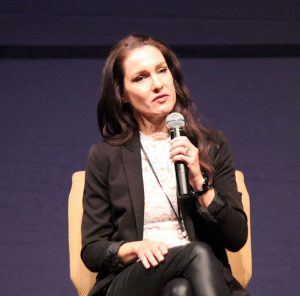 Bird’s Eye Beute-qua-screenwriter substituted blindness for the loss of hearing that sharpened and accentuated Beethoven’s other senses later in life.)
Bird’s Eye Beute-qua-screenwriter substituted blindness for the loss of hearing that sharpened and accentuated Beethoven’s other senses later in life.)
The rest of the film’s ethnically diverse cast (which includes Joshua Brockington as Divante, Samuel Hunter as Jakim, Nayshka Miranda as the besieged music student and Leslie Maine as Trish) matches the high standard set by the picture’s leading lady and screenwriter. Several enjoy terrific singing voices, which contribute to the overall quality of the music included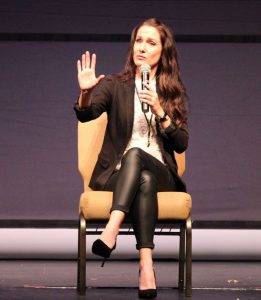 in the film.
in the film.
Featuring original music and an inspiring story of darkest night giving light to a higher purpose that transcends boundary, disability and circumstance, Bird’s Eye illustrates the transformative power of music.
More, Bird’s Eye is a lyrical ode to the human spirit and the upper reaches of creativity that can be unleashed when self-absorbed egocentricity blindly pursuing perfection is replaced by the spirit of collaboration exerted by a group of diverse and damaged individuals striving to achieve a higher purpose.
The film recently 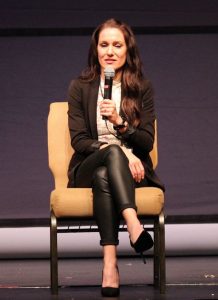 won Best Florida Film at Tally Shorts and Best Short Narrative at the Bonita Springs International Film Festival. It screens during the Fort Myers Film Festival in the Sidney & Berne Davis Art Center during the 2:15 shorts block on Friday, April 12.
won Best Florida Film at Tally Shorts and Best Short Narrative at the Bonita Springs International Film Festival. It screens during the Fort Myers Film Festival in the Sidney & Berne Davis Art Center during the 2:15 shorts block on Friday, April 12.
#BeYou.
March 9, 2019.














 Tom Hall is both an amateur artist and aspiring novelist who writes art quest thrillers. He is in the final stages of completing his debut novel titled "Art Detective," a story that fictionalizes the discovery of the fabled billion-dollar Impressionist collection of Parisian art dealer Josse Bernheim-Jeune, thought by many to have perished during World War II when the collection's hiding place, Castle de Rastignac in southern France, was destroyed by the Wehrmacht in reprisal for attacks made by members of the Resistance operating in the area. A former tax attorney, Tom holds a bachelor's degree as well as both a juris doctorate and masters of laws in taxation from the University of Florida. Tom lives in Estero, Florida with his fiancee, Connie, and their four cats.
Tom Hall is both an amateur artist and aspiring novelist who writes art quest thrillers. He is in the final stages of completing his debut novel titled "Art Detective," a story that fictionalizes the discovery of the fabled billion-dollar Impressionist collection of Parisian art dealer Josse Bernheim-Jeune, thought by many to have perished during World War II when the collection's hiding place, Castle de Rastignac in southern France, was destroyed by the Wehrmacht in reprisal for attacks made by members of the Resistance operating in the area. A former tax attorney, Tom holds a bachelor's degree as well as both a juris doctorate and masters of laws in taxation from the University of Florida. Tom lives in Estero, Florida with his fiancee, Connie, and their four cats.